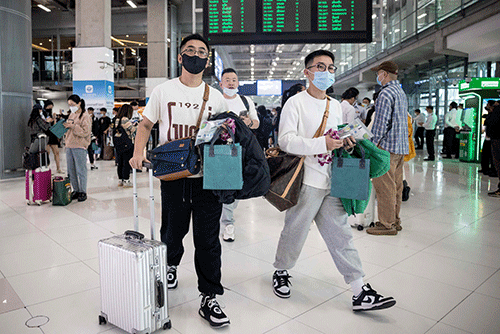Edgar Brandt
Paheja Siririka
As the world scrambles in deciding how to deal with the latest Coronavirus sub-variant, of which two cases have been confirmed in Namibia, the International Air Transport Association (IATA) has issued a statement, saying closing international borders is merely an ineffective knee-jerk reaction.
The statement from IATA, which represents some 300 airlines, comprising 83% of global air traffic, comes as Namibia confirmed two cases of the Covid-19 variant, nicknamed Kraken.
“Several countries are introducing Covid-19 testing and other measures for travellers from China, even though the virus is already circulating widely within their borders. It is extremely disappointing to see this knee-jerk reinstatement of measures that have proven ineffective over the last three years. Research undertaken around the arrival of the Omicron variant concluded that putting barriers in the way of travel made no difference to the peak spread of infections. At most, restrictions delayed that peak by a few days. If a new variant emerges in any part of the world, the same situation would be expected.
That’s why governments should listen to the advice of experts, including the World Health Organisation (WHO), that advise against travel restrictions. We have the tools to manage Covid-19 without resorting to ineffective measures that cut off international connectivity, damage economies and destroy jobs. Governments must base their decisions on ‘science facts’ rather than ‘science politics’,” stated IATA director general Willie Walsh.
The IATA statement was issued after numerous governments around the world imposed or were considering restrictions on travellers from China as coronavirus cases in that country surged, following its relaxation of “zero-Covid” rules.
This was after Beijing’s dropped its zero-Covid policy by which the government used strict lockdowns, mass testing and severe limits to travel to keep the level of virus transmission to a minimum among its massive population. The abrupt turn to strict lockdowns, adopted in the wake of mass popular protests, has caused worry among some countries, which fear the resulting surge in Chinese Covid cases might result in dangerous coronavirus variants.
A number of countries have also cited a lack of reliable Chinese information on variants and are concerned about a wave of infections.
Namibia’s health minister Dr Kalumbi Shangula echoed IATA’s sentiment, yesterday saying restricting passengers from China serves no purpose, as the pandemic is worldwide, and that approach will not help in curbing the virus. “Covid-19 is everywhere in the world. If you restrict people from China, you will get it from people coming from elsewhere. It is a pointless exercise,” said Shangula in response to New Era questions.
Meanwhile, while advising against new travel restrictions, the WHO called the precautionary measures “understandable” in light of the lack of credible information, and urged Beijing to share more data on genetic sequencing, as well as figures on hospitalisations, deaths and vaccinations. China has since rejected criticism of its Covid-19 data and said it expects future mutations to be potentially more transmissible but less severe.
Moreover, the United States of America imposed mandatory Covid-19 tests on travellers from China, beginning 5 January.
As such, all air passengers from China, Hong Kong or Macau, aged two years and older, will require a negative result from a test no more than two days before departure.
The US Centres for Disease Control and Prevention also said the country’s citizens should reconsider travelling to China, Hong Kong and Macau.
Similarly, the United Kingdom will require a pre-departure negative Covid-19 test from passengers from China as of 5 January, their Department of Health said last week. Likewise, France now also requires travellers from China to provide a negative Covid test result less than 48 hours before departure.
Since 1 January, France is also carrying out random PCR Covid tests upon arrival on some travellers coming from China, a French government official told reporters. The French government has also urged all 26 other European Union member states to test Chinese travellers for Covid.
China removed quarantine requirements for inbound travellers this past weekend, effectively reopening its borders three years after the Covid-19 pandemic resulted in severe travel restrictions that decimated the global economy and the world’s air transport industry. In addition to allowing travel to and from other countries, Beijing also reopened air and sea travel with the special administrative region of Hong Kong, allowing family and friends to reunite after years spent apart.
Chinese and other media outlets described massive queues stretching across Hong Kong international airport.
The South China Morning Post reported that as of Sunday evening, more than 45 000 people had travelled by ferry across the border between Hong Kong and mainland China. According to the Reuters news agency, the Chinese Ministry of Transport expects over two billion trips to and from China to take place over the next 40 days.
This represents an increase of nearly 100%, partly due to the start of the Chinese New Year.


